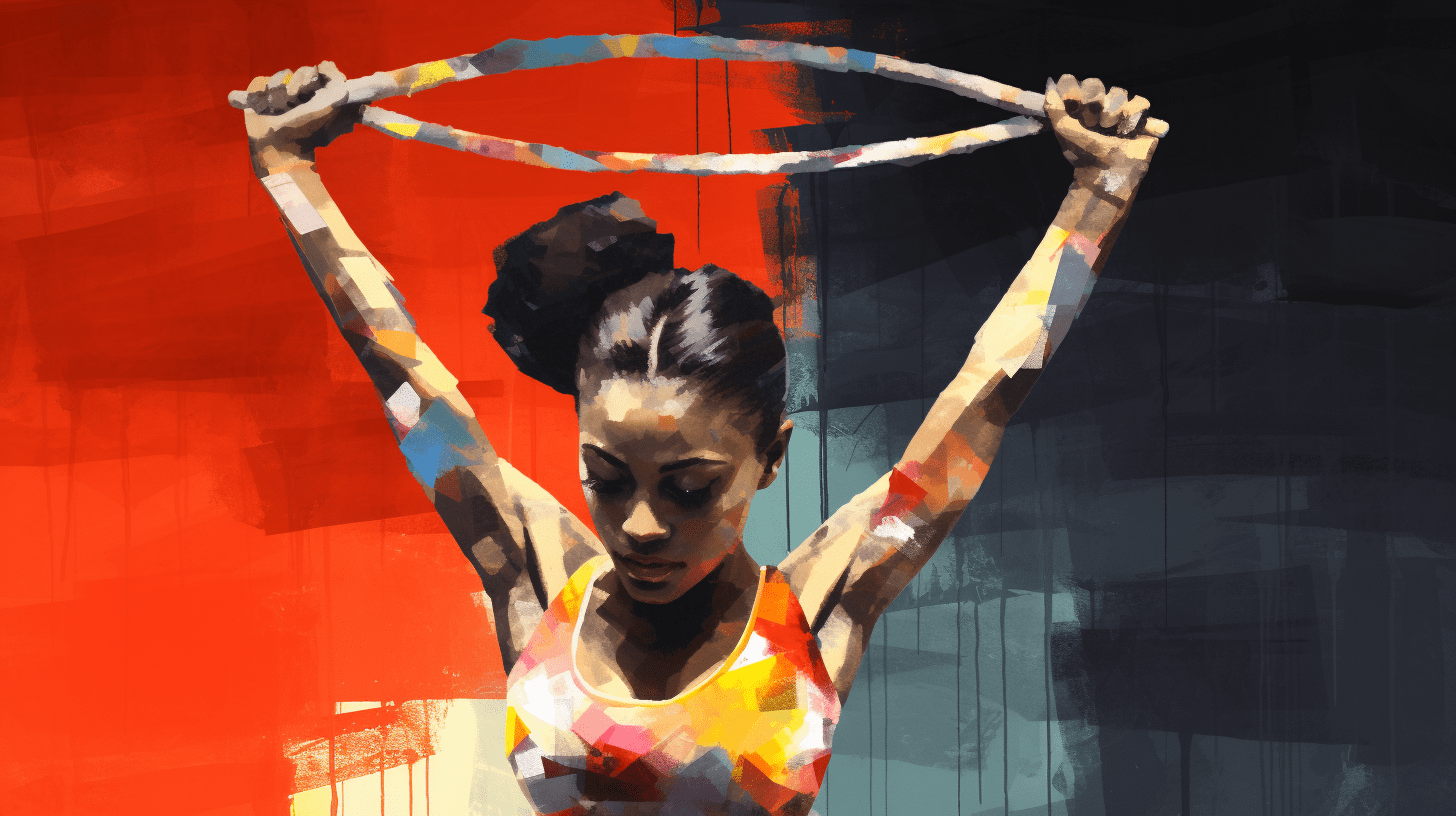- Home
- Wiki
- Learning Center
- Balancing Bets: A Guide to Artistic Gymnastics Betting
Balancing Bets: A Guide to Artistic Gymnastics Betting
Artistic gymnastics is a sports discipline where participants perform gymnastic exercises with dance elements to music.
Gymnastics in Nigeria and the world is 99% a female sport, although there are male divisions. Betting on artistic gymnastics is less popular than betting on football or tennis and has peculiarities.
Types of Bets in Artistic Gymnastics
Betting companies include the discipline in their line-up during the World Championships, the Olympics, and the European Championships. Common types of bets include:
- Victory in the tournament;
- Finishing in the top positions;
- Which of the two athletes will achieve a better result;
- Total points scored.

Victory
The "Victory" market can mean a win in the competition or at a stage, all-around or based on the results of a single exercise. In practice, 3-4 participants who have established themselves as leaders can win.
Podium Finish
Bookmakers offer bets on finishing in the top 3, top 5, or other ranking positions. The number of possible outcomes depends on the level of competition and the scale of the event.
Higher Finish
"Head-to-Head" is a standard betting option for individual sports. The player chooses which of the two participants will score more points. To win the bet, the outcome of the competition is less crucial than the individual results of the selected athletes.
Total
Bets on the total are accepted by bookmakers for the outcome of the competition or an individual performance. The final result for an exercise is considered the average score of the judges' evaluations.
The all-around score is the sum of the points for the exercises. The player makes a prediction - whether the gymnast will score the required number of points or not.
How to Make Analysis and What is to Consider
For successful betting on rhythmic gymnastics, professional players recommend:
- Studying the statistics of participants' successes and failures in the current season.
- Keeping track of news about injuries and the health of athletes.
- Paying attention to the emotional state of gymnasts.
- Taking an interest in the performance program.
- Clarifying the composition of the judges.
- Watching video recordings of competitions.
- Finding out the venue of the tournament.
- At the Olympic Games, athletes compete for 2 sets of medals – in group and individual all-around, while at the World Championships, the line-up for gymnastics is broader – athletes compete for 9 sets of awards.
Current Season's Results
Before placing a bet, it's important to study the performance statistics of the selected athlete in the current season. Important information about the preparation level of participants can be derived from the results of qualifying stages, national competitions, and regional tournaments.
The competition calendar and statistics are available on the websites of the International Gymnastics Federation, the European Gymnastics Union, the Nigerian Rhythmic Gymnastics Federation, and other national associations.

Injuries and Illnesses
Fans learn about the health of athletes from sports news, interviews, blogs, and social networks.
Rhythmic gymnastics is a sport prone to injuries; participants often suffer bruises and strains during training and competitions. Recovery takes a long time, and physical activities are prohibited or significantly reduced after an injury.
In sports news, one can always find information about injuries, health problems, and withdrawal from performances. Athletes' pages and sports communities on social networks help track gymnasts' plans and well-being.

Emotional State
An emotional mindset is crucial in both individual and team performances. Scandals and exclusions from the participant list are common in international tournaments.
The psychological state and motivation of athletes can be affected by family issues and personal events. Another significant factor is the relationship with the coach, who helps gymnasts refine their technical skills and simultaneously acts as a psychologist in preparation for the performance.
Athlete's Program
An unwritten rule in rhythmic gymnastics is to present a new routine at every significant competition. The jury tends to negatively evaluate repeated performances, although a partial repetition of elements and combinations might be acceptable.
Preparing a new routine requires time and fine-tuning, especially for group performances. Typically, the routine is polished at smaller or national tournaments before being showcased at world championships.
A fan can track where and how successfully an athlete has presented a new routine during the current season.
Basic performance requirements by which a bettor can assess an athlete's readiness include:
- Utilising the entire carpet area while moving;
- Engaging both hands when working with apparatus;
- The constant motion of the apparatus during the performance.
Composition of Judges
Rhythmic gymnastics is a young sport with constantly evolving criteria and scoring systems. The panel of judges in rhythmic gymnastics often demonstrates subjectivity.
Factors that influence the objectivity of a judge include:
- The authority and reputation of the athlete;
- Personal feelings towards the participant or coach;
- Fatigue.
Before placing a bet, it's advisable to find information about the panel of judges and study the competition's regulations.
Judges have different tasks: some assess the technique of execution, while others evaluate artistry. Every element, movement, or mistake has a "value" in points.
Judges evaluate:
- The technical complexity of the exercise;
- Cleanliness of execution;
- Types of steps jumps, and movements;
- Posture and the "extension" of arms and legs;
- Synchronisation with the music's rhythm;
- Selection of music and costume.
Common mistakes by gymnasts that lead to penalties include:
- Repeating routines or significant portions of previous performances;
- A costume that doesn't match the music;
- Misalignment with the music's rhythm;
- The gymnast or apparatus going out of bounds;
- Falling or mistakes while throwing the apparatus.
- Watching videos of past competitions
In every championship, 3-4 leading gymnasts participate, and they are the ones most bet on. Watching video broadcasts of past performances and reading comments from sports journalists can help identify the strengths and weaknesses of the gymnasts, the correlation between mistakes and the athlete's psychological state, shed light on the reasons for failures, and reveal motivation.
The Venue
The competition's venue is a factor crucial for prediction in any sport. Athletes often perform better at home or in places where they have trained and competed multiple times.
An unfamiliar stadium and a large audience can increase anxiety and reduce the psychological readiness of a gymnast.
The competition's location is significant for newcomers with little experience participating in primary and international competitions.
Features of Betting on Artistic Gymnastics
Markets for betting on rhythmic gymnastics are often not prominently featured in bookmakers' listings. Experienced bettors recommend considering the specific nuances of rhythmic gymnastics when placing bets:
- Individual and group performances;
- Different routines – using a ball, clubs, ribbon, hoop, and rope;
- The reliance on scores on various criteria, with the jury's composition, plays a crucial role.

Most athletes excel with a specific apparatus and successfully perform some aspects like jumps, bends, and throws. When forming their listings, betting company analysts often only consider past tournament statistics and overrate the odds of apparent leaders.
Factors determining successful betting on rhythmic gymnastics include:
- Accurate forecasting is done by examining the maximum amount of available information before the start of the competition.
- Justified odds set by the bookmaker and the presence of value bets.
The limited popularity of gymnastics frequently leads to underestimation or overestimation of the likely outcomes.
Advantages and Disadvantages
Advantages
- High chance of finding value odds.
- Ability to track an athlete's success over an extended period.
- Accessibility of information for analysis.
Disadvantages
- Low betting limits.
- Infrequent presence of competitions in bookmaker listings.
- The limited number of professional forecasts in open sources.
Summary
Rhythmic gymnastics is a potentially profitable direction for bookmaker clients; a sport people bet on during significant competitions.
Standard market options include victory, podium finish, head-to-head standings, and total points.
The primary betting strategy is to compile a quality analytical forecast for the event.
When examining the bookmaker's odds, there's a high chance of finding value bets.
FAQ
Rhythmic gymnastics is a sport in which athletes perform routines using apparatuses such as hoops, balls, clubs, ribbons, and ropes, usually set to music. The routines involve a combination of dance, ballet, and gymnastic elements.
Major competitions, such as the Olympics, World Championships, and European Championships, are the most popular times for betting on this sport.
Common market options include betting on victory, podium finish, head-to-head standings between athletes, and the total points scored.
It's essential to compile a quality analytical forecast for the event, study the performance statistics of the athletes in the current season, and consider other factors like injuries, venue, and the composition of the jury.
Rhythmic gymnastics is less popular than mainstream sports like football or tennis. As a result, bookmakers might need more detailed insights, leading to potential value bets due to inaccurately set odds.
The venue can impact an athlete's performance, especially for newcomers. Athletes tend to perform better at home or in familiar places. An unfamiliar environment and a large audience can increase anxiety and affect performance.
The jury plays a crucial role, as scoring in rhythmic gymnastics is somewhat subjective. Different judges have varying perspectives on artistry, execution, and technique, so understanding the composition and past judgments can offer insights into potential scoring biases.

Comments0